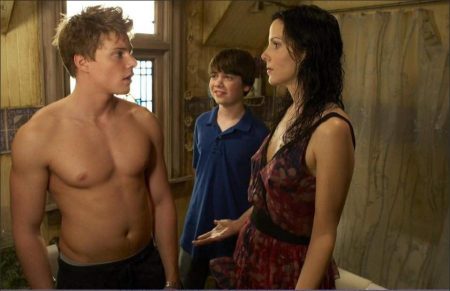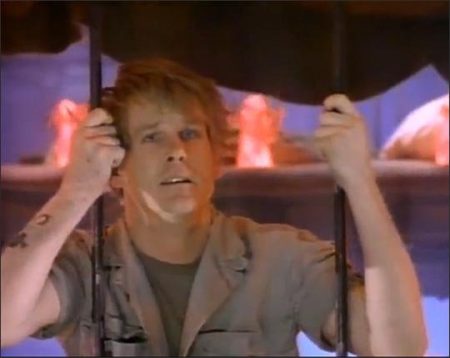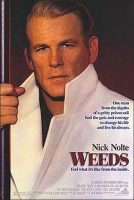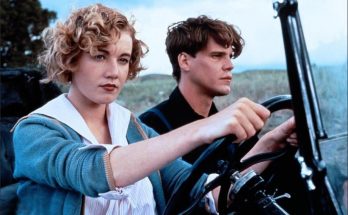Taglines: Feel what it’s like from the inside.
Weeds movie synopsis. Lee Umstetter is a lifer at San Quentin prison and a multiple suicide attempter. Eventually, another prisoner suggests reading to find something better to do with his time. Lee takes that advice and finds himself inspired from what he reads to write a play about life in prison. He has auditions and assembles a cast from his fellow inmates.
The play proves popular and it catches the attention of a female reporter who writes about it, creating publicity that allows for a parole for him. Once out, he later reassembles his cast when they come out to do the play professionally. However, they learn that the demands of the life outside are difficult to cope with for the newly released and their play needs to be changed in major ways while they struggle to make it succeed.
Weeds is a 1987 American drama film about a prison inmate who writes a play that catches the attention of a visiting reporter. The film was directed by John D. Hancock, and stars Nick Nolte, Ernie Hudson, and Rita Taggart.
Film Review for Weeds
“Weeds” (selected theaters) is a wonderful movie for Nick Nolte. Not since “North Dallas Forty,” in which he was a battered pro football player, has Nolte had a movie that allowed him to be so completely the star. “Weeds” makes full use of his brawny masculine presence yet demands that he dig deep into his resources as an actor, and the result is a large-scale, emotion-charged performance.
Gratifyingly, the rest of the film is up to Nolte’s level. He’s cast as Lee Umstetter, a suicidal lifer at San Quentin who discovers an entire new world in books, devouring everything from Tolstoy to Jacqueline Susann and emerging determined to become a playwright. With other inmates, he forms an acting troupe and the Brecht-like musical of prison life that he devises is so electrifying that a Bay Area critic (Rita Taggart) begins a campaign to get him paroled–even though he’s been sentenced to life imprisonment for armed robbery “with aggression.”
“Weeds” was adapted by its director John Hancock with his wife Dorothy Tristan from her novel inspired by the true story of ex-con Rick Cluchey and his Barbed Wire Theater. Like Hancock’s “Bang the Drum Slowly,” it’s the kind of movie that’s unafraid to wear its heart on its sleeve. “Weeds” celebrates triumph over adversity in a fashion that’s downright patriotic, and its acting style is in the feisty, full-blooded Jimmy Cagney-Warner Bros. tradition. This is not to say that “Weeds” is old-fashioned: It has too much passion and vitality to be that.
The Hancocks spring Lee as quickly as they can without straining credibility, since the focus of their story is how Lee and his fellow ex-cons survive on the outside as they tour the country. There’s plenty of suspense here: If anyone violates his parole, it’s back to prison not only for him but also for Lee. Umstetter discovers how much harder it is for him and his troupe to connect with civilian audiences; he also discovers he needs to break his play away from its key source, Jean Genet’s “Deathwatch.” As it evolves into a more personal work, it sheds its original name, “The Cages,” and becomes “Weeds.”
As artistic director for San Francisco’s Actor’s Workshop, Hancock became involved with Cluchey’s San Quentin Drama Group, and that experience, plus his own extensive career in the theater, gives “Weeds” an exceptionally convincing portrait of the workings of a theater company, both in performance and backstage. Yet this is only a rich backdrop for the film’s vivid people and their sometimes uproarious, sometimes dangerous experiences on the road.
Nolte shows us a man who thought he would rather be dead, coming alive through artistic expression. In order to get on with their story, the Hancocks make this a rapid transformation. Luckily, Nolte has the intelligence and that all-essential aura of reserves held in check to make this believable; the flowering of Umstetter plays like Helen Keller suddenly discovering how to communicate in “The Miracle Worker.” In its on-stage sequences, “Weeds” suggests that should Nolte have the time or the inclination, he could be sensational in the theater.
Nolte has a terrific group of actors to play off: Ernie Hudson as Bagdad, the giant-sized murderer who auditions with a rousing “Impossible Dream”; John Toles-Bey as Navarro, a sharp, fast-talking dude who’s been a pimp and extortionist; Bill Forsythe as Burt, a big, dense shoplifter; Lane Smith as Claude, a sweet-tempered, unsophisticated embezzler with a terrible toupee and worse clothes who becomes the mainstay of the troupe; Mark Rolston as Dave, a blond, curly-haired exhibitionist who inadvertently reverts to type on stage, and Joe Mantegna as the hearty Carmine, a replacement who is the only professional actor and only non-criminal in the company.
Taggart’s role is based on the critic Barbara Blayden, who successfully campaigned for Cluchey’s 1966 release and who later married him. Taggart has a mature sophistication that contrasts amusingly with Nolte’s rough-hewn earthiness; her best moment occurs when she wisely, lovingly smiles rather than laughs out loud at the sight of the large devil’s head tattooed on Lee’s stomach as he prepares to make love to her with an intense hunger (and much tenderness).
Cluchey and the other ex-cons’ experiences were probably a lot grittier than they are in “Weeds,” which as story-telling offers eye-watering, larger-than-life comedy and drama rather than a documentary-like reality. Even so, it does offer implicit criticism of a penal system that punishes more than it rehabilitates and a system of justice which bears down upon minorities and the poor far more than upon the rich.
The slate grays of the film’s various authentic prison settings provide a strong psychological contrast for the lush palette of colors cinematographer Jan Weinecke brings to the rest of the picture. “Weeds” (MPAA-rated: R for blunt language and adult situations) is the kind of film that makes us realize how hungry we are for genuine, rousing emotion on the screen–and then proceeds to do an exceptional job of providing it.
Weeds (1987)
Directed by: John D. Hancock
Starring: Nick Nolte, Rita Taggart, Ernie Hudson, Mark Rolston, Lane Smith, John Toles-Bey, Joe Mantegna, Essex Smith, Sam L. Waymon, Anne Ramsey, William Forsythe
Screenplay by: John D. Hancock, Dorothy Tristan
Production Design by: Joseph T. Garrity
Cinematography by: Jan Weincke
Film Editing by: David Handman, Jon Poll, Chris Lebenzon
Costume Design by: Mary Kay Stolz
Set Decoration by: Jerie Kelter
Art Direction by: Pat Tagliaferro
Music by: Angelo Badalamenti
MPAA Rating: R for blunt language and adult situations.
Distributed by: De Laurentiis Entertainment Group
Release Date: October 16, 1987
Views: 437





